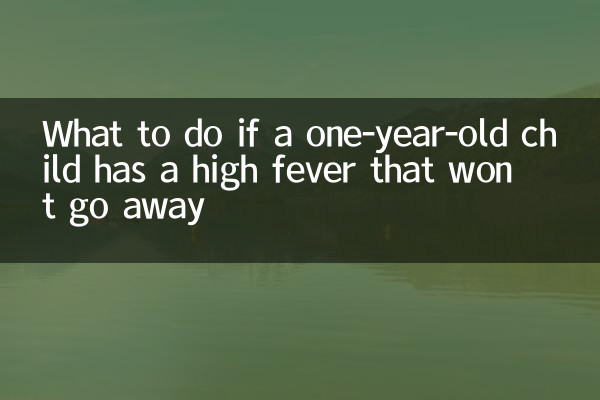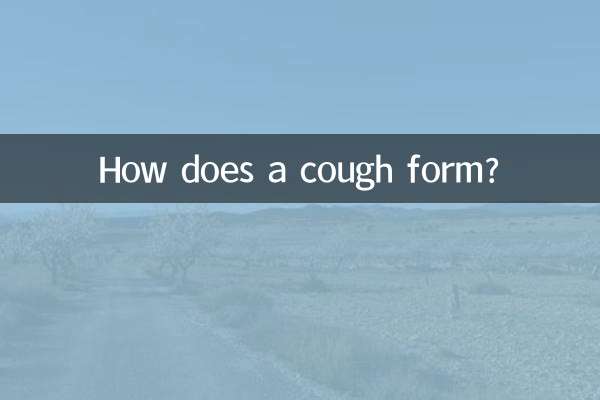What should I do if my one-year-old child has a high fever that doesn’t go away? Hot topics and practical guides across the Internet
Recently, discussions on "handling high fever in infants and young children" have soared on social media and parenting forums. In particular, the issue of persistent high fever in children around 1 year old has attracted widespread attention. This article combines popular medical science content on the Internet in the past 10 days to organize structured solutions for you.
1. Popularity data of topics related to high fever across the entire network (last 10 days)

| Topic keywords | peak search volume | Main discussion platform |
|---|---|---|
| Infant with high fever above 39 degrees | 250,000 times per day | Baidu/WeChat |
| Judgment of acute rash in young children | 180,000 times | Xiaohongshu/Douyin |
| Alternate use of antipyretics | 120,000 times | Zhihu |
| Physical cooling misunderstandings | 98,000 times | mom network |
2. Emergency treatment steps for high fever that persists
1.Body temperature monitoring:Use an electronic thermometer to measure every 2 hours and record the body temperature change curve.
2.Medication options:According to the recommendations of the Pediatric Branch of the Chinese Medical Association:
| age | Recommended medicine | Dosage standards |
|---|---|---|
| 6-12 months | Acetaminophen | 10-15mg/kg/time |
| More than 12 months | Ibuprofen | 5-10mg/kg/time |
3.Physical cooling:Wipe the neck, armpits, and groin with warm water at 32-34°C. Alcohol is prohibited.
3. Warning signs that medical treatment is necessary
You need to seek medical attention immediately when:
| Symptoms | possible causes | Urgency |
|---|---|---|
| Lasts 40℃ for more than 24 hours | bacterial infection | ★★★★★ |
| with projectile vomiting | Meningitis | ★★★★★ |
| Purple rash appears | sepsis | ★★★★★ |
| The fontanel is obviously raised | increased intracranial pressure | ★★★★ |
4. The five issues that parents are most concerned about recently
1.Q:Can antipyretics be used interchangeably?
A:The latest "Journal of Pediatric Pharmacy" points out that alternating medication may increase the risk of liver damage, and it is recommended to use a single medication.
2.Q:Will high fever burn out the brain?
A:A simple fever will not damage the nervous system, but if the temperature continues to exceed 41°C, you need to be alert to febrile convulsions.
3.Q:How to diagnose acute rash in young children?
A:It is characterized by high fever, followed by a rash that subsides after 3-5 days. The rash usually starts from the neck and spreads.
4.Q:Are fever-reducing patches effective?
A:Studies show that its cooling effect is limited, and its best use is to protect the brain during the prevention of febrile seizures.
5.Q:How to feed during high fever?
A:Replenish water in small amounts and frequently, increase the frequency of breastfeeding, and choose easy-to-digest rice porridge as complementary food.
5. Nursing points recommended by experts
• Keep room temperature at 24-26°C and humidity at 50%-60%
• Wear a single layer of pure cotton clothing to help dissipate heat
• Record the frequency of urination and defecation (should be ≥ 6 times per day)
• Vaccination needs to be delayed for 2-4 weeks during fever
Recent clinical data shows that about 68% of high fever cases in 1-year-old children are caused by viral infections. Parents do not need to be overly anxious. But special attention is needed:Infants under 3 months old who have a fever must seek medical attention immediately, whose immune systems are not yet fully developed, have significantly different risk levels.
(Note: The above data is compiled from the latest guideline in October 2023 from authoritative channels such as Dingxiang Doctor, CCTV Health Science, and National Children’s Medical Center)

check the details

check the details